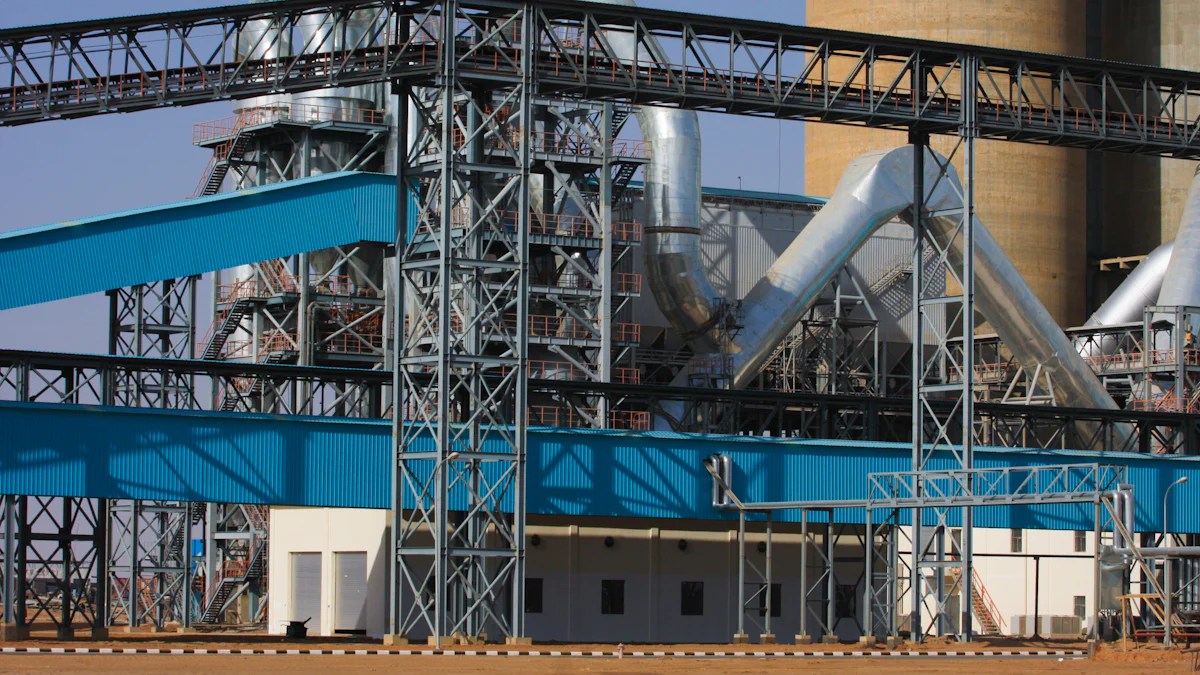
Le choix du porte-wafer RTP approprié joue un rôle crucial dans la fabrication de semi-conducteurs. Il affecte directement l'efficacité et la qualité de votre processus de production. Vous devez vous concentrer sur des facteurs clés comme la qualité du matériau, la compatibilité avec votre équipement et la durabilité sous des températures élevées. La fiabilité des fournisseurs est également importante pour assurer un rendement uniforme. Lors de l'approvisionnement d'une usine basée en Chine, vous rencontrez des défis uniques, tels que la vérification des normes de qualité et la communication claire. Toutefois, cela offre aussi des possibilités de solutions rentables sans compromettre la qualité.
Principaux enseignements
- Privilégier les matériaux de haute qualité comme le carbure de quartz ou de silicium pour les porteurs de wafer RTP afin d'assurer la durabilité et les performances dans des conditions extrêmes.
- Assurer la compatibilité entre le transporteur de plaquettes RTP et votre équipement de fabrication pour éviter les inefficacités et les dommages potentiels.
- Envisagez des options de personnalisation pour adapter le transporteur à vos besoins de production spécifiques, en améliorant l'efficacité et en réduisant les risques de contamination.
- Vérifier les certifications et la conformité de votre fournisseur basé en Chine pour s'assurer qu'ils répondent aux normes de l'industrie et fournissent des produits fiables.
- Effectuer des essais d'échantillons approfondis afin d'évaluer la qualité et la fonctionnalité du transporteur de plaquettes RTP avant de passer des commandes importantes.
- Équilibrez le coût et la qualité en évaluant la valeur globale du transporteur plutôt que de se concentrer uniquement sur le prix le plus bas.
- Établir des relations solides avec les fournisseurs grâce à une communication et à des négociations efficaces pour obtenir des conditions favorables et une qualité uniforme.
Comprendre la RTP Transporteurs de wagons

Qu'est-ce qu'un transporteur de wagons RTP?
Un transporteur de plaquettes RTP est un composant spécialisé utilisé dans la fabrication de semi-conducteurs. Il maintient et supporte les wafers pendant le traitement thermique rapide (RTP). Ce processus consiste à chauffer des wafers à des températures élevées pendant de courtes durées pour modifier leurs propriétés. Le transporteur s'assure que le wafer demeure stable et sûr tout au long de cette étape critique.
Vous constaterez que les porteurs de wafer RTP sont généralement fabriqués à partir de matériaux comme le quartz ou le carbure de silicium. Ces matériaux résistent à la chaleur extrême et maintiennent l'intégrité structurelle. La conception du transporteur minimise également les risques de contamination, qui sont essentiels au maintien de la qualité des wafers. En utilisant le bon transporteur, vous pouvez obtenir des résultats uniformes dans votre processus de fabrication.
Rôle des transporteurs de wagons RTP dans la fabrication de semi-conducteurs
Les porteurs de plaquettes RTP jouent un rôle essentiel pour assurer le succès de la production de semi-conducteurs. Ils servent de barrière de protection entre le wafer et l'équipement de traitement. Cette protection réduit les risques de dommages physiques ou de contamination lors des traitements thermiques.
Le transporteur aide également à distribuer la chaleur uniformément sur la surface de wafers. Une distribution uniforme de la chaleur est essentielle pour obtenir des modifications précises des propriétés des wafers. Sans le bon transporteur, vous pouvez faire face à des problèmes comme le chauffage inégal, qui peut conduire à des défauts dans le produit final.
De plus, la compatibilité du transporteur avec votre équipement affecte l'efficacité de vos opérations. Un porte-avions bien appariés assure une manipulation fluide et réduit les temps d'arrêt causés par le désalignement ou l'usure de l'équipement. En sélectionnant le transporteur RTP approprié, vous pouvez améliorer la qualité et l'efficacité de votre processus de fabrication de semi-conducteurs.
Facteurs clés à prendre en considération pour choisir un transporteur de wagons RTP
Qualité des matériaux et spécifications
Le matériau d'un porteur de plaquettes RTP détermine sa performance et sa longévité. Vous devriez prioriser les transporteurs fabriqués à partir de matériaux de haute qualité comme le quartz ou le carbure de silicium. Ces matériaux résistent aux températures extrêmes et maintiennent l'intégrité structurale pendant le traitement thermique rapide. Des matériaux de mauvaise qualité peuvent entraîner une déformation ou une contamination, ce qui compromet la qualité de votre wafer.
Examiner attentivement les spécifications du transporteur. Recherchez des détails tels que la conductivité thermique, la résistance à la chaleur et la stabilité chimique. Ces facteurs influent directement sur la capacité du transporteur à se produire dans des conditions exigeantes. Un transporteur avec des spécifications précises assure des résultats cohérents dans votre processus de fabrication de semi-conducteurs.
Compatibilité avec les procédés de fabrication
La compatibilité du transporteur RTP wafer avec votre équipement de fabrication est cruciale. Un transporteur inégalé peut causer des inefficacités, un mauvais alignement, voire des dommages à votre équipement. Vous devriez vérifier que le transporteur s'intègre parfaitement dans votre configuration existante. Cela comprend la vérification des dimensions, de la conception et de la compatibilité des matériaux.
Considérez les exigences spécifiques de votre procédé de fabrication. Par exemple, si votre processus implique des cycles à haute température, assurez-vous que le transporteur peut gérer ces conditions sans compromettre les performances. Un transporteur compatible améliore l'efficacité opérationnelle et réduit les temps d'arrêt, vous permettant de maintenir un flux de production fluide.
Durabilité et résistance thermique
La durabilité est un facteur clé lors de la sélection d'un transporteur de plaquettes RTP. Les remplacements fréquents dus à l'usure augmentent les coûts et perturbent les calendriers de production. Vous devriez choisir un transporteur conçu pour supporter une utilisation répétée sans perdre son intégrité structurelle. Les transporteurs durables offrent une fiabilité à long terme, vous permettant d'économiser du temps et de l'argent.
La résistance thermique est tout aussi importante. Le transporteur doit résister à des changements rapides de température sans craquer ni déformer. Une haute résistance thermique assure une distribution uniforme de la chaleur à travers le wafer, ce qui est essentiel pour obtenir des modifications précises. Un transporteur avec une excellente durabilité et résistance thermique supporte des résultats cohérents et de haute qualité dans votre processus de fabrication.
Options de personnalisation
La personnalisation joue un rôle essentiel dans la sélection du porte-wafer RTP approprié pour vos besoins de fabrication de semi-conducteurs. Chaque processus de production a des exigences uniques, et une approche unique-fits-all fonctionne rarement. En optant pour des transporteurs personnalisés, vous pouvez vous assurer qu'ils correspondent parfaitement à vos exigences opérationnelles spécifiques.
Commencez par évaluer les options de conception disponibles. Les transporteurs personnalisés peuvent être adaptés aux dimensions exactes de vos wafers et de vos équipements. Cet ajustement précis minimise le risque de désalignement et améliore l'efficacité de votre processus de production. Vous devriez également considérer la forme et la structure du transporteur. Un transporteur bien conçu réduit les risques de contamination et assure une distribution uniforme de la chaleur pendant le traitement thermique rapide.
La personnalisation des matériaux est un autre facteur critique. Différents procédés de fabrication peuvent nécessiter des supports fabriqués à partir de matériaux spécifiques, tels que le quartz ou le carbure de silicium. Vous pouvez demander des modifications à la composition du matériau pour répondre aux exigences thermiques et chimiques de votre application. Cela garantit que le transporteur fonctionne de manière optimale dans vos conditions d'exploitation.
De plus, certains fabricants offrent des caractéristiques avancées comme des revêtements de surface ou des structures renforcées. Ces améliorations peuvent améliorer la durabilité du transporteur et la résistance à l'usure. Vous devriez discuter de ces options avec votre fournisseur pour déterminer quelles caractéristiques ajoutent de la valeur à votre processus de production.
Lorsque l'approvisionnement d'une usine basée en Chine, une communication claire sur vos besoins de personnalisation est essentielle. Fournir des spécifications détaillées et confirmer que l'usine a la capacité de les satisfaire. Demander des prototypes ou des échantillons pour vérifier la qualité et la fonctionnalité du transporteur personnalisé avant de s'engager dans des commandes en vrac.
En priorisant la personnalisation, vous pouvez optimiser les performances de votre porte-wafer RTP et obtenir de meilleurs résultats dans votre processus de fabrication de semi-conducteurs.
Évaluation d'une usine de matières premières en Chine pour les transporteurs de Wafer RTP

Certifications et conformité
Vous devriez toujours vérifier les certifications d'une usine de matière première chinoise avant de prendre une décision. Les certifications démontrent que l'usine respecte les normes et les règlements de l'industrie. Cherchez des certifications comme ISO 9001, qui assure des systèmes de gestion de la qualité, ou ISO 14001, qui se concentre sur la gestion de l'environnement. Ces certifications indiquent que l'usine maintient une qualité uniforme et suit des pratiques éthiques.
Le respect des normes internationales est tout aussi important. Les usines qui produisent des wafers RTP doivent satisfaire à des exigences spécifiques en matière de qualité des matériaux et de procédés de fabrication. Vérifier si l'usine respecte les normes de l'industrie des semi-conducteurs, telles que les directives SEMI (Semiconductor Equipment and Materials International). Cela garantit que le transporteur effectuera de manière fiable dans votre processus de fabrication.
Demander de la documentation pour confirmer ces attestations et ces dossiers de conformité. Une usine digne de confiance fournira cette information sans hésitation. En priorisant les usines certifiées et conformes, vous réduisez le risque de recevoir des produits sous-normes.
Réputation et critiques d'usine
La réputation d'une usine en dit long sur sa fiabilité. Recherche de l'usine Histoire et antécédents dans la production de porteurs de wafer RTP. Une usine ayant une solide réputation offre souvent une qualité cohérente et répond aux attentes des clients.
Les évaluations en ligne et les témoignages peuvent fournir des renseignements précieux. Recherchez les commentaires d'autres entreprises de l'industrie des semiconducteurs. Les avis positifs sur la qualité du produit, les délais de livraison et le service à la clientèle indiquent un fournisseur fiable. Par contre, des examens négatifs peuvent signaler des problèmes potentiels.
Vous pouvez également demander des références à l'usine. Contactez les clients précédents vous permet de recueillir des informations de première main sur leurs expériences. Une usine ayant une solide réputation n'aura aucun problème à partager des références. En évaluant les évaluations et la réputation, vous pouvez faire un choix éclairé.
Communication et appui
Une communication efficace joue un rôle crucial dans le travail avec une usine basée en Chine. Vous devriez évaluer dans quelle mesure l'usine comprend bien vos exigences et répond à vos demandes. Une communication claire et rapide permet de répondre à vos besoins sans retard ni malentendu.
Évaluer le système de soutien de l'usine. Une usine fiable fournit un soutien dédié tout au long du processus d'achat. Il s'agit notamment de répondre aux questions, de répondre aux préoccupations et d'offrir une assistance technique. Un solide soutien vous aide à résoudre les problèmes rapidement et à maintenir un fonctionnement fluide.
Les barrières linguistiques peuvent parfois poser des défis. Assurez-vous que l'usine a du personnel qui peut communiquer couramment dans votre langue préférée. Une mauvaise communication peut entraîner des erreurs dans les spécifications du produit ou des retards de livraison. En priorisant les usines avec une excellente communication et le soutien, vous créez une base solide pour un partenariat réussi.
Essais d'échantillons et assurance de la qualité
L'analyse d'échantillons est une étape critique lorsque l'on s'approvisionne en wafers RTP dans une usine de Chine. Il vous permet de vérifier la qualité du produit avant de vous engager sur des commandes à grande échelle. En effectuant des tests approfondis, vous pouvez vous assurer que le transporteur respecte vos exigences de fabrication et les normes de l'industrie.
Commencez par demander des échantillons à l'usine. Examiner ces échantillons pour déterminer la qualité du matériau, l'intégrité structurelle et la précision de la conception. Portez une attention particulière à la capacité du porteur à résister à des températures élevées et à maintenir l'uniformité thermique. Ces facteurs influent directement sur la performance de votre procédé de fabrication de semi-conducteurs.
Effectuez des tests fonctionnels sur les échantillons dans votre environnement de production. Cette étape vous aide à évaluer la compatibilité du transporteur avec votre équipement et vos processus. Vérifier les problèmes comme le désalignement, la distribution inégale de la chaleur ou les risques de contamination. L'identification précoce de ces problèmes vous fait gagner du temps et des ressources à long terme.
Vous devriez également évaluer les pratiques d'assurance qualité de l'usine. Des usines fiables appliquent des mesures strictes de contrôle de la qualité à chaque étape de la production. Interrogez-vous sur leurs processus d'inspection et leurs protocoles d'essai. Les usines qui suivent des procédures rigoureuses d'assurance de la qualité sont plus susceptibles d'offrir des produits cohérents et fiables.
Demander une documentation détaillée sur les résultats des essais. Cela comprend des rapports sur la composition du matériau, la résistance thermique et la précision dimensionnelle. Ces documents fournissent des informations précieuses sur la performance et la durabilité du transporteur. Une usine qui partage volontiers ces informations démontre la transparence et la confiance dans ses produits.
Enfin, envisagez de procéder à des essais tiers pour une évaluation impartiale. Les laboratoires d'essais indépendants peuvent vérifier la conformité du transporteur aux normes et spécifications de l'industrie. Cette étape supplémentaire ajoute une autre couche d'assurance, vous aidant à prendre une décision éclairée.
En priorisant les tests d'échantillons et l'assurance de la qualité, vous minimisez les risques et vous assurez que le transporteur de plaquettes RTP correspond à vos besoins. Cette approche protège votre processus de production et améliore l'efficacité globale de vos opérations de fabrication de semi-conducteurs.
Considérations relatives aux coûts lors de l'approvisionnement des transporteurs chinois RTP Wafer
Balancing Cost and Quality
Lorsque l'approvisionnement d'un transporteur de wafers RTP en provenance de Chine, équilibrer les coûts et la qualité devient un facteur critique. Vous devriez éviter de vous concentrer uniquement sur le prix le plus bas. Les transporteurs à faible coût compromettent souvent la qualité ou la durabilité des matériaux, ce qui peut entraîner des dépenses à long terme plus élevées en raison de remplacements fréquents ou de problèmes de production. Au lieu de cela, évaluez la valeur globale fournie par le transporteur. Les transporteurs de haute qualité peuvent avoir un coût initial plus élevé, mais ils assurent une meilleure performance et une plus longue durée de vie.
Pour prendre une décision éclairée, comparez plusieurs fournisseurs. Demander des devis détaillés comprenant les spécifications des matériaux, les procédés de fabrication et les mesures d'assurance de la qualité. Cette information vous aide à déterminer si le prix correspond à la qualité du transporteur. Investir dans un transporteur fiable réduit les risques et améliore l'efficacité de votre processus de fabrication de semi-conducteurs.
Expédition et logistique
L'expédition et la logistique jouent un rôle important dans le coût total de l'approvisionnement en provenance de Chine. Vous devez rendre compte des frais d'expédition, des droits de douane et des retards éventuels. Ces facteurs peuvent avoir une incidence importante sur votre budget et votre calendrier de production. Comprendre le processus logistique vous aide à planifier efficacement et éviter les dépenses imprévues.
Choisissez un fournisseur ayant une expérience en expédition internationale. Des fournisseurs fiables fournissent des informations claires sur les options d'expédition, les coûts et les délais de livraison estimés. Vous devez également confirmer si le fournisseur offre une assurance pour l'expédition. Les envois assurés vous protègent contre les pertes financières en cas de dommages pendant le transit.
Envisagez de travailler avec un transitaire ou une entreprise de logistique. Ces professionnels s'occupent du dédouanement, de la documentation et du transport, assurant ainsi un processus de livraison sans heurt. En gérant efficacement l'expédition et la logistique, vous pouvez minimiser les retards et maintenir un flux de production régulier.
Négociation avec les fournisseurs
La négociation est une étape clé pour obtenir la meilleure offre pour votre transporteur de wafer RTP. Vous devriez aborder les négociations en comprenant clairement vos besoins et votre budget. Étudier les prix du marché et utiliser ces connaissances pour établir une fourchette de prix raisonnable. Cette préparation renforce votre position lors des discussions avec les fournisseurs.
Concentrez-vous sur l'établissement d'une relation mutuellement bénéfique. Au lieu de pousser au prix le plus bas, soulignez l'importance de la qualité et de la fiabilité. Les fournisseurs sont plus susceptibles d'offrir des conditions favorables lorsqu'ils vous voient valoriser leur expertise et leurs produits. Vous pouvez également négocier des avantages supplémentaires, comme des rabais sur les commandes en vrac, des garanties prolongées ou des modalités de paiement flexibles.
Une communication efficace est essentielle au cours des négociations. Énoncez clairement vos attentes et confirmez tous les accords par écrit. Cette documentation assure la transparence et prévient les malentendus. En négociant stratégiquement, vous pouvez sécuriser des transporteurs de haute qualité à un prix concurrentiel tout en favorisant un partenariat solide avec votre fournisseur.
Choisir le transporteur RTP approprié nécessite une évaluation minutieuse de la qualité du matériau, de la compatibilité, de la durabilité et de la fiabilité du fournisseur. Vous devriez effectuer des recherches approfondies et tester des échantillons pour vous assurer que le transporteur répond à vos besoins de fabrication. Une communication claire avec les fournisseurs permet d'éviter les malentendus et assure la fluidité des transactions.
Privilégier la qualité par rapport au coût pour obtenir des avantages à long terme. Vérifier les certifications pour confirmer la conformité aux normes de l'industrie. Établir des relations solides avec des fournisseurs fiables pour obtenir des résultats uniformes.
Adopter une approche systématique de votre processus de sélection. Ce faisant, vous pouvez améliorer l'efficacité et maintenir des normes élevées dans vos opérations de fabrication de semi-conducteurs.